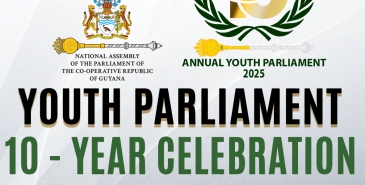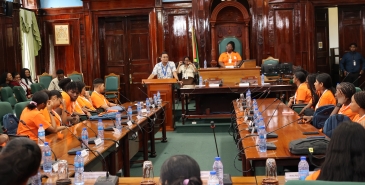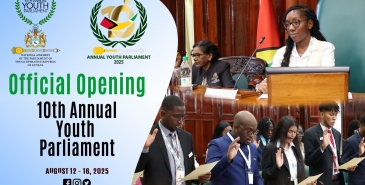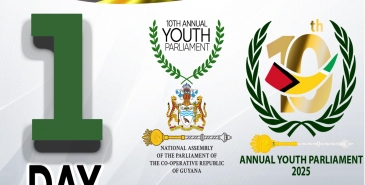Restoration of the Annual Subvention/Grant to the Critchlow Labour College
Speech delivered at: 70th Sitting - Tenth Parliament - 27 February, 2014
27 February, 2014
5373
Dr. Roopnarine: Thank you Mr. Speaker. I rise to contribute to the debate on this motion. I hope to be able to engage some of the arguments made by my brother and Hon. Member Dr. Gopaul in the course of my presentation.
Looking at the WHEREAS clauses of the motion the first talks about the Labour College through its three campuses in Linden, Georgetown and Berbice educating thousands of Guyanese adults and youths for decades. Allow me to say that the three campuses, Linden and Corriverton campuses that had to be closed in 2012, were in fact quite flourishing campuses during their time of existence. At Corriverton, they only offered CXC and I remember on a visit I made there, I was very struck by how orderly and in good spirits students and staff were. Linden on the other hand offered not only CXC, but the Critchlow flagship course the ISS.
I noted the observation made by my Friend, the Hon. Trevor Williams, that should we get Critchlow in order, the prospect of extending it throughout the country into other areas, is a very attractive proposition to me, but for that to happen there is much that needs to be done.
I am glad that my Friend Mr. Gopaul, the Hon. Member, spoke about the context and the history of what took place at the Critchlow Labour College. The fact is that the subvention has had a particular history itself. The subvention was first withdrawn, I believe, in 2004. I believe at the time it may also have had to do with accountability. With some argue and pressure from the (TUC, it was restored in January of 2005.
I think that we need to pay attention to the sequence of events that flowed from the Guyana Public Service Union (GPSU)/Federal Unions of Government Employees (FUGE) strike of 1999. In many ways the tragedy of Critchlow Labour College really flowed from the convulsions of that period.
There was a decision by the TUC at the time. I believe that the TUC, in calling a three day strike in support, which was supposed to start on 20th May and I think that both the Guyana Agricultural Workers Union (GAWU) and NAACIE were present at the TUC when that decision was made.
We have to look at the tragic events of 19th May, 1999, when the police opened fire on picketers. It was in effect, out of this convulsion that led to the withdrawal of the GAWU from the TUC and the formation of the Federation of Independent Trade Unions (FITUG) in 2000.
I am very sympathetic to the line of argument that says the Critchlow Labour College really, rather than being a victim of the divisions of the Labour Movement, really ought to be a vehicle of its unification. That has always been my belief; that if we cannot unite the Labour Movement on the issue of education, I do not know what we can unite it on. It has always been my conviction and it has been my conviction when I served and was pleased to serve as principle of the College at the time. My Hon. Friend remembers the conversations we had at the time and it was my strong belief even then, that the places on the board that were reserved for the trade unionists, should really have been open to trade unionist from across the division. To my mind that would have been one of the ways in which we could have begun the work. It seems, frankly, the divisions, as outlined by my Friend the Hon. Dr. Gopaul, that the divisions that he described to us and which have been persisting for so long, and for which, frankly, no resolution seems to be in sight - that there is no imminent resolution to which we can look forward, the fact of the matter is, the Critchlow Labour College remains there as a potential vehicle to work towards this reunification and I think it ought to be treated as such.
The motion spends a great deal of time on what I call the non-labour aspects of the Critchlow Labour College. These non-labour aspects: the providing of second opportunity to students who would otherwise be deprived of an education was a very valuable service that the Critchlow Labour College had been performing for the use of the country. All of that is un-doubtable.
As a former student himself, the Hon. Trevor Williams spoke with feeling about what having the Critchlow Labour College available to young people like himself, meant to his generation. I know there are people in this House, including, as he told us, the Hon. Dr. Nanda Gopaul. I notice my Friend the Hon. Robert Persaud is not here, but I believe that he also was a Member of this House who benefited enormously from having the Critchlow Labour College at their disposal.
I have to say that the withdrawal and this for me was the real sadness of the matter; that the withdrawal of the subvention really came at a point when the Critchlow Labour College was really expanding its programmes and increasing its capacity. We had established relations with the Cipriani Labour College in Trinidad. For instance, I have here a memorandum that was written to the Board by Mr. Phillips, making arrangements for the ABE Degree Programme, which we were going to mount in association with Leeds Metropolitan University in England. The memorandum outlines, in great, detail what the contents of such a programme could be and even went so far as to describe how we might be advertising for students and so on.
We were really at a point, I believe of expanding the capacity of the College when the blow came. My own feeling at the time and my feeling remains the same, is that the Critchlow Labour College essentially became a victim of the struggles within the Labour Movement and it was classic case of the grass dying while the elephants were fighting.
It has always seem to me that the tragedy of the Critchlow Labour College was that these students, who so badly need the institution for their second opportunity, were in fact the victims of a convulsion that had nothing to do with them. They did not provoke it; they did not participate in it; this is a convulsion above their heads; and as a result of that convulsion, they were, in fact, being deprived.
If we look at the original mandate of the College and I quoting here from the division statement that was put out by the CLC, which I have here that was established - We have some little contradictions on dates, but they are not important - that it was established in 1865, as “an integral part of the Trades Union Council of Guyana”. In the preamble of the bylaw, the Critchlow Labour College of 1967 – the incorporation took place in 1967. That development was intended, “To expand the scope and activities of the institute.”
What is evident is that the CLC from its inception had been an institution, the growth and development of which, has responsive to the needs of its stakeholders in the wider community. Let me quote from the bylaws of the College. The bylaws explicitly spell out the aims and objectives:
“The need for a labour college arises out of the expanded role and responsibility of trade unions in Guyana. Leaders who are deeply aware of the problems and opportunities of the Trades Union Movement and who can make a significant contribution to the social and economic growth are a continuing requirement. A labour college providing basic studies in the humanities and the social sciences, as well as specialised instructions in the theory and practice of trade unionism would do much to meet this need.”
And it goes on:
“The activities of the Critchlow Labour College are designed:
(1) To provide trade unions training and workers’ education at all level of union responsibility;
(2) To conduct courses, seminars and other such activity in field of industrial relations;
(3) To undertake research in problems affecting the Labour Movement and industrial relations.”
If we look at what CLC was doing at the time, already, in September, 2007, the CLC was preparing to offer associate degrees in Labour Studies, Occupational Safety and Health and Human Resources Management. These were all courses that had been design, were on the books and were to be offered in 2007.
I want to draw your attention to the declarations made at an event I believe my trade union brothers in the Chamber here would remember. At the special Georgetown conference in 2006 to mark the 80th Anniversary of the Visionary Conference of 1926, the leadership launched the Caribbean Association for Labour Education (CALE). This was, in effect, what the trade unionists of the Region were saying, that workers’ education was to be in forefront of the initiatives for renewal.
Writing on this matter in an essay that I published in The Sky’s wild Noise on page 122, I said then:
“The intention of the October, 2006 gathering in Georgetown was to reconnect the division and energy of the illustrious founders of 1926, education was to be the means of reconnection.”
The Georgetown communiqué was adopted unanimously by the conference and has set out a plan of actions derived from the presentations and floor discussions that committed the trade union and labour movements and it heads a list of menu of measures to:
“Expand the intensified and co-ordinate progressive programmes of labour education aim at further developing a cadre of conscious labour activists and leaders equipped to meet the ever new challenges of a rapidly changing environment.”
One of the things that we did at this time at CLC was to launch the Pollydore Institute. Recognising that, in fact, we needed to go beyond what it is we were doing and intensify the work in the area of trade union education, we established the Pollydore Institute. Article 3 of the rules of the Pollydore Institute Foundation was set out and it set out a number of objectives:
(a) “To promote solidarity among organisations and institutions of civil society so as to work together towards the realisation of a democratic and ecologically viable world society based on the principles of justice, liberty and the rule of law;
(b) To combat all forms of exploitation and oppression;
(c) To promote all measures of a nature to extend the decision making powers of populations concerning the different aspects of their economic, social and political life;
(d) To promote respect for democratic rights, especially freedom of association and expression and the right not to be oppressed by anyone or group;
(e) To support populations in their struggle to achieve or to preserve their rights to self-determination and the free expression of their national culture;
(f) To promote equality of men and women in employment and occupation and in society and to combat all forms of discrimination on grounds of racial, ethnic, sexual, religious or cultural affiliations; and
(g) To support all efforts toward the establishment of lasting peace based on freedom for all.”
This is a very ambitious outline of objectives of the Pollydore Institute. When we established it, the idea was essentially to have it compliment, in all the ways that we saw it working, the work that was going on within the CLC.
It was a time when I felt myself that the CLC was lacking in the area of labour education. We were doing our work in relation to the second opportunity students, that was quite true and we were doing it well. But my own feeling was that the original conception of the labour college, as a school for trade unionism, that that aspect of our work had, in fact, declined.
There was, in fact, a comment made by Kenneth Joseph and this was published in 18th March, 2008. When the General Secretary of FITUG, Mr. Kenneth Joseph, told Stabroek News that FITUG was not happy with what was taking place with the CLC, including the membership of the Board and College’s shift from that of a workers’ college to becoming a business venture and being used as a stepping stone for entry to the University of Guyana. “We are looking to see how we can try to bring it back to being a workers college, focusing on workers’ education for labour.”
I want to say that, in fact, what we were attempting to do was very much in line with attempting to answer this deficit. The deficit had to do with labour education. What we did was, we established for instance, labour workshops. We set up the Critchlow Labour Seminars and these were inaugurated in May week of 2006. The Critchlow Labour Seminars, which were monthly lectures and workshops, were held. The first one was a lecture given by George Depena on Hubert Nathaniel Critchlow and the Movement of 1926. This was followed by Mr. Christopher Ram on the case for reform for the National Insurance Scheme (NIS). In July, we had Dr. Lisa Trotz – “What do we mean by Labour – A feminist’s Discussion of why connections matter”. In August we had David Hinds lecturing on “Organised Labour and Democratic Resistance in Post-Colonial Guyana”. We had further lectures that were planned by Stanley Greaves, Dr. Terry Roopnarine, Clarence Ellis, Vibert Cambridge on topics ranging from the photography of labour to the history of E.R. Burrows Working Peoples’ Art Class, the music and the working people in Guyana. In early July Sir Roy Trotman, chairman of the Workers’ Group and vice-chairman of the governing body of the International Labour Organisation (ILO) came and lectured at the Critchlow Labour Seminar. He lectured on labour standards, rights and obligations.
I have to say, regretfully, that the response of the unions themselves to this activity at the Critchlow Labour College, that everything to do with raising the levels of labour education, that the response of the unions were rather lukewarm. Very few of their members actually attended the workshops. I felt that this was, I think, sad because the workshops were really designed for the unions. It was designed for trade unionist and shop stewards and that kind of thing. The fact that the trade unions did not buy into what the Critchlow Labour College was attempting to do at the Critchlow Labour Seminars could hardly be blamed on the College.
It was also a time when we were mounting in the auditorium of the Critchlow Art Exhibitions. It was my view, while I was there, that it was not enough to bring these children in and essentially to give them only the second opportunity to pass exams, but to, in fact, expose them to the wider world of culture. We had concerts in the auditorium; we had the National Dance Group who came; we mounted art exhibitions in the auditorium, all with a view to expanding the horizons of these students who had taken advantage of the second opportunity.
This is where we were in 2007 when the subvention was withdrawn. At the time of the withdrawal of the subvention, issues were raised about financial accountability. This remains a fact. There were requests for work plans. I remember the work plan because I did a lot of work on it myself. The work plan for 2007 and audited reports for 2004, 2005 and 2006 were submitted. Copies were sent to the Ministries of Labour, Education and the Office of the President. Mr. Garnett, who was at the time the Chairman of the Board and the President of the TUC, had in fact dispatched these documents and there was never any reply to them. That remains a fact.
Then we came to my friend, Mr. Baksh, who made a fairly astonishing comment, which was reported in 18th February of 2006, when he said that the Critchlow Labour College subvention was tied to trade union unity. I am quoting from 18th February, 2008, an article from the Stabroek News.
“Minister of Education Shaik Baksh says the fractured trade union movement has to resolve its issues as a precondition for further subventions to the Guyana Trades Union Congress and the Critchlow Labour College. The Government stop its monthly subvention to the College in August last year, responding to a question by Shelia Holder of the Alliance For Change. During Thursday’s Sitting of the National Assembly, Baksh said, subventions were not a right to be enjoyed. He said that even though the subventions were approved by Parliament, agencies that get them still have to fulfil certain conditions.
According to the Chairman of the Board, Andrew Garnett, the Government had asked for a work plan for 2007, as well as audited reports for 2004, 2005 and 2006. He said that all of these had been submitted and he had written to the Ministers of Finance and education and sent copies to the Office of the President.”
I think that to ask for the Trade Union Movement, especially after we have heard about the depths of its division, why this division existed, what are the obstacles to the unification of the movement and so on. To ask that this happen before we can issue the subvention is really to misunderstand process. I wish to say and I see my Friend Mr. Nadir is snorting, but I wish to say that we should see the Critchlow Labour College, not as a beneficiary of the unification of the movement that is very far off, but we should see it, as we try to argue, as a vehicle to bring about the unification. This is how it can happen. [Mr. Nadir: That was what Mr. Shaik Baksh said.] That is not what he said.
I hope the Hon. Mr. Nadir would credit me with being able to read what I read.
There was another proposal coming from FITUG and this came from Mr. Duncan. Mr. Duncan who says honourably that FITUG cannot allow the CLC to go extinct – that is what he said. We need to find the solution which will give the Government the comfort the need to restore the subvention, adding that because it was the manner in which the subvention was used that the Government withdrew. When pressed, Duncan sited poor accountability. Even though the CLC would have submitted audited reports, he said that, “If they do not understand the purpose of the subvention, then they could not fulfil its objectives.” He went on to say that he believes that if we establish a situation where FITUG, the TUC and the Government, that this striker, would be able, in effect to bring the Critchlow Labour College back to where it should be.
Mr. Speaker, as it was pointed out, the Board of the College, if it is properly constituted, does have representatives from the Ministry of Labour, the Ministry of Education, and University of Guyana. I thank my Friend, the Hon. Dr. Nanda Gopaul, for listing how in fact the Board is composed.
My problem is that if we fail to grapple with this and work towards the restoration of the subvention, ensuring that at the level of the Critchlow Labour College, arrangements are made that would, in fact, give the comfort that is required. I believe the people at the Critchlow Labour College are disposed towards providing those comfort levels that were they to do that since the objection is about accountability and so on. It guarantees if accountability could be provided locally at Critchlow, if we could look at the composition of the Board so that it could be in fact, inclusive of the whole labour movement, then I cannot see what can possibly stand in the way of the restoring of the subvention.
I wish to commend my Friend, the Hon. Trevor Williams for bringing this motion to the National Assembly. I believe that it cannot be beyond us to see why it is the restoration of the subvention and the revitalisation of the Critchlow Labour College should not be, I think, an ambition of this Assembly. The fact is that the withdrawal of the subvention in the end only penalises the children of poor and it contributes to the impoverishment of the entire Trade Union Movement. We believe that Shop Stewards today and union representatives are in need of trade union education and can benefit from it. When we penalise the Critchlow Labour College and withhold the subvention we are penalising not only the children of the poor, but we are, in fact, pauperising the entire Trades Union Movement and keeping the levels of trade unionism at an unacceptably low level. I thank you Mr. Speaker.
Speech delivered by:
What's New

17 August, 2025
10th Annual Youth Parliament Closes: Celebrating a Decade of Impact, Excellence, and Youth Empowerment10th Annual Youth Parliament Closes: Celebrating a Decade of Impact, Excellence, and Youth Empower

13 August, 2025
Youth Parliamentarians Assemble for Grand Rehearsals for the 10th Annual Youth Parliament

12 August, 2025
10th Annual Youth Parliament Kicks Off – Young Voices, Bold Ideas, Bright Futures!

11 August, 2025
10th Annual Parliament Kicks off tomorrow

